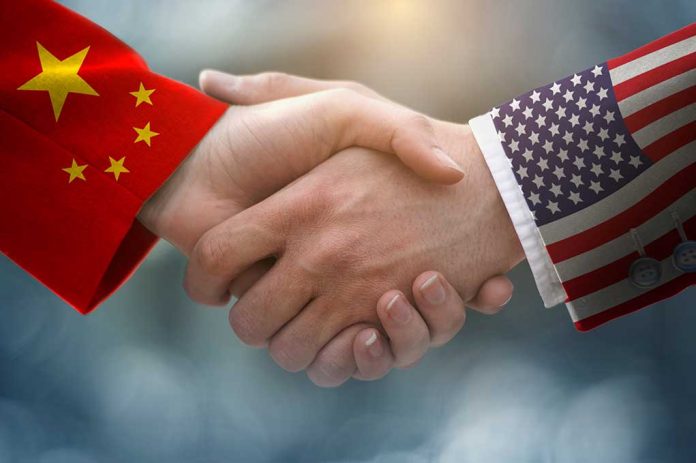
China accuses the Trump administration of sabotaging trade talks with heavy-handed targeting of Huawei’s AI chips, threatening to derail crucial economic negotiations despite recent progress in Geneva.
Key Takeaways
- The US Commerce Department’s threats against global use of Huawei’s Ascend AI chips have sparked Chinese accusations of undermining trade consensus reached in Geneva
- Despite softening its official stance by removing “anywhere in the world” language from guidance, the Trump administration maintains pressure on Chinese semiconductor development
- China warns that continued US export controls will damage global chip supply chains and ultimately weaken America’s own industrial competitiveness
- While US targets Chinese tech, Nvidia strategically announced plans to build an AI supercomputer in Taiwan and strengthen partnerships with Taiwanese manufacturers
- Beijing has vowed to protect its interests and development rights in response to what it describes as discriminatory US trade practices
US Chip Controls Threaten Hard-Won Trade Progress
The Chinese government has directly accused the Trump administration of undermining recent economic negotiations after the US Commerce Department issued warnings about Huawei’s Ascend AI chips. According to Chinese officials, the guidance that globally using these chips would violate US export controls torpedoed the consensus carefully established during high-level trade talks in Geneva. Beijing claims these measures represent a discriminatory approach that creates insurmountable obstacles for achieving meaningful progress in bilateral economic relations despite previous diplomatic breakthroughs.
Beijing officials stated they have “negotiated and communicated with the US at all levels through the China-US economic and trade consultation mechanism, pointing out that the US’s actions seriously undermined the consensus reached at the high-level talks between China and the US in Geneva,” stated Beijing.
The controversy centers on guidance issued by the Commerce Department warning businesses about “the potential consequences of allowing US AI chips to be used for training and inference of Chinese AI models.” Commerce Department. While the department later revised its language to remove the phrase “anywhere in the world,” Chinese officials maintain that the substantive restrictions remain unchanged. The dispute highlights the ongoing tension in US-China relations concerning high-technology trade, with semiconductors continuing to be the focal point of strategic competition.
Chinese Ministry Fires Back at US Export Controls
China’s Ministry of Commerce has taken a firm stance against what it perceives as America’s weaponization of export controls. In a strongly worded statement, the ministry accused the Trump administration of abusing regulatory mechanisms to interfere with legitimate Chinese business activities, particularly the development and deployment of domestically produced AI chips. Officials in Beijing argue that these actions not only damage Chinese enterprises but also disrupt global semiconductor supply chains and stifle technological innovation at an international level, creating harmful market distortions.
“Tripping others won’t make you run faster,” said the MOFCOM spokesperson.
The Chinese Foreign Ministry has amplified these criticisms, accusing American policymakers of excessively expanding the concept of national security to justify economic restrictions. China’s representatives consistently characterize US policies as protectionist measures that will ultimately undermine America’s industrial competitiveness rather than enhance it. This messaging reflects Beijing’s broader strategy of positioning itself as a defender of free trade principles while portraying US actions as destabilizing to the global economic order and multilateral trading system that has benefited all nations.
Strategic Technology Competition Intensifies
While US-China tensions escalate over semiconductor technology, industry developments at Asia’s largest tech conference, Computex, have highlighted the geopolitical dimensions of the competition. Taiwan appears to be benefiting from the US-China rift, with industry observers noting new opportunities for Taiwanese companies to collaborate with American chipmakers. Nvidia’s announcement of plans to build an AI supercomputer in Taiwan and deepen partnerships with Taiwanese manufacturing giants Foxconn and TSMC illustrates how the island is leveraging its strategic position in the global semiconductor landscape.
“Washington’s targeting of Huawei could offer Taiwan more opportunities to strike deals with American chipmakers, an analyst told Bloomberg: At the conference Monday, Nvidia announced plans to build an AI supercomputer on the island and deepen its partnerships with Taiwan-based chip firms Foxconn and TSMC.”
For Huawei, the situation further complicates its efforts to develop advanced semiconductors for both AI applications and smartphones, as the company continues to face multiple layers of US sanctions. Despite these challenges, China has demonstrated remarkable resilience in developing indigenous semiconductor technology. Huawei’s Ascend chips represent China’s determination to achieve technological self-sufficiency in critical areas, even as the Trump administration maintains pressure through export controls and other regulatory mechanisms designed to restrict China’s access to cutting-edge semiconductor technology.
Future of US-China Trade Relations
As tensions over semiconductor technology continue to simmer, the prospects for meaningful progress in US-China trade negotiations appear increasingly uncertain. China has unequivocally demanded that the US correct its actions regarding Huawei’s chips and uphold the consensus reached in Geneva. The Chinese government has also explicitly warned that it will take necessary measures to protect its interests and development rights, signaling a potential escalation if the Trump administration maintains its current stance on Chinese technology exports and development.
Neither the Commerce Department nor the White House has officially responded to China’s accusations about undermining trade talks, creating additional uncertainty about the administration’s strategic objectives. While some regulatory rollbacks have occurred in other areas, the core restrictions on advanced technology exports to China remain firmly in place. This approach reflects the administration’s view that technological competition, particularly in areas like artificial intelligence and advanced computing, represents a fundamental national security concern that transcends conventional trade policy considerations.


